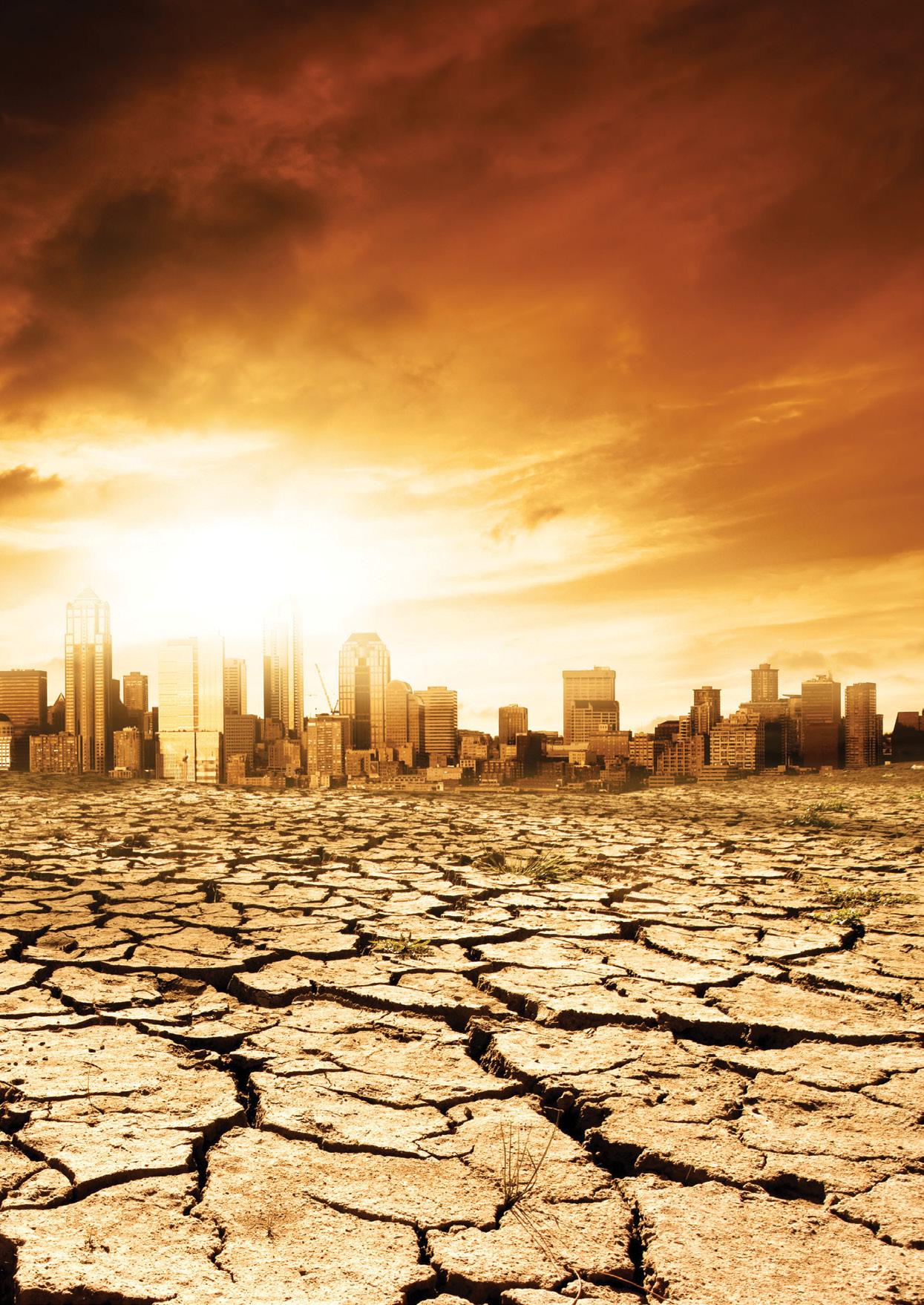
6 minute read
CLIMATE CHANGE
States must brace for more heatwaves, deaths
Climate change is causing heatwave records to be smashed in ways that would have been considered fantasy just a few years ago, a leading climate scientist has warned. Monash University’s Professor Neville Nicholls said the increase in the number and severity of extremely hot summer days in Victoria was unprecedented, making it impossible to estimate accurately the impact it would have on people’s health. The Victorian State Government recently estimated 374 people may have died because of extreme heat in the final week of January. And that was before Victoria was hit by the Black Saturday fires. Professor Nicholls, a lead author with the agenda‑setting Intergovernmental Panel on Climate Change, said many people thought of climate change caused by greenhouse gas emissions as something that would happen in 2030 or 2070. “With heatwaves it is not. Climate change is happening now and will happen all through the rest of our lifetimes,” he told a Victorian State Government conference on adapting to climate change. “We are seeing huge changes in the frequency and the extremity of heatwaves ‑ every population centre in the world is being threatened by this.” The rise in extreme heat is one of the factors predicted to exacerbate the risk of bushfires as climate change takes hold. Professor Nicholls said heat records for many centres were broken more than once last summer, often by huge margins by meteorological standards. Melbourne had never before experienced a run of three days hotter than 42 degrees. The final week of January had three consecutive days topping 43 degrees. In March 2008, Adelaide had 15 days hotter than 35 degrees — seven more than the previous record. “The old records are not just being broken by increments, they are being smashed,” Professor Nicholls said, pointing to other heatwaves this decade in Europe, the US, Asia and south‑eastern Australia. He said adapting to cope with extreme heatwaves would be easier than factoring climate change into other aspects of life. Measures included increasing fluid intake, keeping cool and reducing physical activity. The number of nights that do not drop below 20 degrees, linked with increased mortality rates, has risen by 20 per cent over the past 50 years. During summer there are many urban Orienteering events held in the early evenings. In recent years temperatures have not dropped as quickly as they used to, resulting in events starting when temperatures are still above 40 degrees. Competitors need to ensure they have adequate hydration when temperatures remain high.
The Climate Project Asia-Pacific Summit
SO says the Honourable Al Gore, former Vice President of the United States and the joint recipient, along with the International Panel on Climate Change, of the 2007 Nobel Peace Prize. Mr Gore was speaking in Melbourne on Sunday July 12 at The Climate Project Asia-Pacific Summit, where he came to train 261 Climate Project presenters from nineteen countries throughout Australasia and the Pacific. They will take back his climate crisis presentation and work with their communities to find a solution to the climate crisis in the remaining five months before the UN climate change negotiations in Copenhagen. More than 2,000 people from 22 countries applied to take part in the three-day event, and the passion and commitment of all the applicants was overwhelming. The 261 individuals who were selected to be trained represent an astonishingly broad social and geographical range of people. They were drawn from some of the world’s largest economies to some of the smallest and most vulnerable island states. People from Bangladesh, China, Fiji, India, Indonesia, Pakistan, Papua New Guinea and the Solomon Islands joined those from New Zealand and from across all parts of Australia, to make their way to Melbourne for a single purpose. From Fiji came Reapi Masau, who has already seen the small island on which she was born erode so much that its inhabitants have been forced to leave, and the sand dunes in which she used to play be reclaimed by the sea. Whilst Khalida Brohi, from Pakistan’s mountainous border region with Afghanistan, has already lived through years of drought, followed by devastating flash floods, and has found that the indigenous knowledge of generations can no longer predict the changing climate conditions. Their backgrounds may have been very different, and they may have all had different stories to tell, but the trainees were united in their reason for being there - to become an agent of real change in solving the problem of climate change. Diplomats, doctors and chief executives joined students, economists, and school principals in discussion, and a fruit grower, a fire-fighter, and an associate professor of philosophy could all find common ground.
The trainees heard from a range of experts, including eminent scientist Dr Graeme Pearman and Australian Conservation Foundation Executive Director Don Henry, about the challenges faced by the global community and the solutions needed to help avoid dangerous climate change. They were also given training to help develop the personal skills needed to inspire change in their communities, in this crucial year for climate change before the UN negotiations in Copenhagen this December. “Countries in the Asia-Pacific region are going to be crucial in a good outcome at Copenhagen,” said Don Henry. “All countries need to lead on this issue – just as we need to do the right thing at home. The delegates are united in wanting to find a solution to avoid the worst of dangerous climate change. They will now return to their communities and act as agents of change, asking their leaders to be part of the solution to the climate crisis.” In a message recorded specifically for the Summit environmentalist Dr David Suzuki helped end the first day on a high note, and the levels of energy and enthusiasm among the trainees remained high on day two, as Mr Gore greeted them with the reminder that this was ‘a time of extraordinary promise and extraordinary risk.’ Mr Gore presented an updated version of his renowned slideshow, made famous by the film An Inconvenient Truth, and spoke about the science of climate change and the global impacts it will have. Bleak images of the changing face of our planet were in stark contrast to beautiful photographs of Earth taken from space, which show us the fragility of the biosphere in which we live, and the essential need to protect it. But the main focus of his talk was on solutions, which include investment in renewable energies and green industries, improved public transportation systems, improved energy efficiency standards for both goods and buildings, the introduction of carbon emission reduction schemes globally, and legislation by our politicians to ensure that these things happen. The issue of climate change may seem difficult, if not impossible to solve, but there was no one in the room who doubted it could be done. Mr Gore reminded attendees that in 1961, President John F Kennedy issued a challenge to his countrymen – to put a man on the moon and bring him safely home within the decade. Many doubted it could be achieved. But only 8 years and 2 months later, Neil Armstrong took his ‘giant leap for mankind.’ In Mission Control that day, the average age of the systems engineers was only 26. They had heard Kennedy’s challenge whilst still only teenagers, and, ignoring all the naysayers, they had risen to the challenge and they had met it. And so it is with the challenge of climate change. We already have the scientific and technological solutions we need to meet this challenge, and the message of the summit was that now we must raise the awareness of the crisis among our fellow citizens and bring about a change in consciousness which must, ultimately, be met with political action and solutions. The 261 people who are now the faces of The Climate Project Asia-Pacific Summit believe it can be done, and are now at home and work, starting the process. As Mr Gore has said, ‘all that is lacking is political will, but in our great democracies, political will is a renewable resource.’












